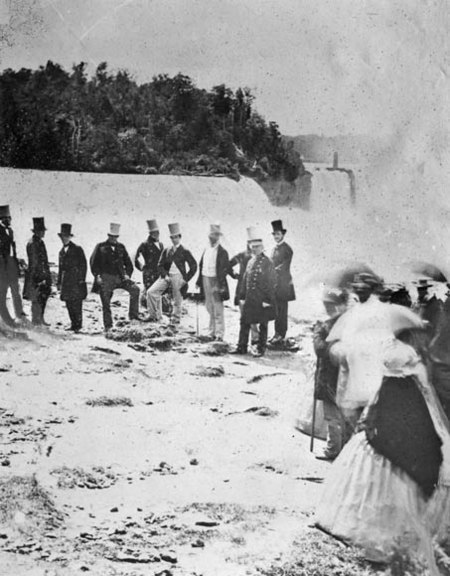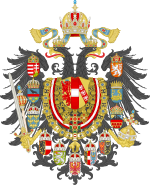Friedrich Ferdinand von Beust
| |||||||||||||||||||||||||||||||||||||||||||||||||||||||||||||||||||||||
Read other articles:

King of the United Kingdom from 1901 to 1910 For other uses, see Edward VII (disambiguation). Edward VIIPortrait by W. & D. Downey, 1900s King of the United Kingdomand the British Dominions Emperor of India Reign22 January 1901 – 6 May 1910Coronation9 August 1902Imperial Durbar1 January 1903PredecessorVictoriaSuccessorGeorge VBorn(1841-11-09)9 November 1841Buckingham Palace, London, EnglandDied6 May 1910(1910-05-06) (aged 68)Buckingham Palace, London, EnglandBurial20 May 1910Roya…

Babirusa buru Babyrousa babyrussa Status konservasiRentanIUCN2461 TaksonomiKerajaanAnimaliaFilumChordataKelasMammaliaOrdoArtiodactylaFamiliSuidaeTribusBabyrousiniGenusBabyrousaSpesiesBabyrousa babyrussa (Linnaeus, 1758) Tata namaSinonim takson Sus babyrussa Linnaeus, 1758[1] (basionym) ProtonimSus babyrussa DistribusiAgihan (coklat) EndemikIndonesia lbs Babirusa buru (Babyrousa babyrussa), juga disebut sebagai babirusa tualangio, babirusa maluku, babirusa emas, atau babirusa berambut ada…

本條目存在以下問題,請協助改善本條目或在討論頁針對議題發表看法。 此條目需要补充更多来源。 (2018年3月17日)请协助補充多方面可靠来源以改善这篇条目,无法查证的内容可能會因為异议提出而被移除。致使用者:请搜索一下条目的标题(来源搜索:羅生門 (電影) — 网页、新闻、书籍、学术、图像),以检查网络上是否存在该主题的更多可靠来源(判定指引)。 此�…

Artikel ini sudah memiliki daftar referensi, bacaan terkait, atau pranala luar, tetapi sumbernya belum jelas karena belum menyertakan kutipan pada kalimat. Mohon tingkatkan kualitas artikel ini dengan memasukkan rujukan yang lebih mendetail bila perlu. (Pelajari cara dan kapan saatnya untuk menghapus pesan templat ini) Artikel ini perlu dikembangkan agar dapat memenuhi kriteria sebagai entri Wikipedia.Bantulah untuk mengembangkan artikel ini. Jika tidak dikembangkan, artikel ini akan dihapus. Pe…

Cen 岑Chinese character for surname CenPronunciation[tsʰə̌n] (Mandarin)[sɐ̏m] (Cantonese)[gîm] (Hokkien)Language(s)ChineseOriginLanguage(s)Old ChineseWord/nameChinaMeaningSteep hill, mountainOther namesVariant form(s)Ts'en, Tsen, Sam, Shum, Sham, Sum, Sang, Gim, Khim, Chim Cen is the Mandarin pinyin romanization of the Chinese surname written 岑 in Chinese character. It is romanized Ts'en in Wade–Giles, and variously as Sam, Sum, Sham, Shum in Cantonese, Gim, Kh…

Strada statale 363di GuardiagreleLocalizzazioneStato Italia Regioni Abruzzo Province Chieti DatiClassificazioneStrada statale Inizioex SS 84 presso Croce di Sant'Eusanio Fineex SS 263 presso Bocca di Valle Lunghezza19,400[1] km Data apertura1962 Provvedimento di istituzioneD.M. 1/02/1962 - G.U. 97 del 13/04/1962[2] GestoreTratte ANAS: nessuna (dal 2001 la gestione è passata alla Provincia di Chieti) Percorso Manuale La ex strada statale 363 di Guardiagrele (SS 363…

Alejandro Garnacho Informasi pribadiNama lengkap Alejandro Garnacho[1]Tanggal lahir 1 Juli 2004 (umur 19)Tempat lahir Madrid, SpanyolTinggi 180 m (590 ft 7 in)[1]Posisi bermain WingerInformasi klubKlub saat ini Manchester UnitedNomor 17Karier junior2015–2020 Atlético Madrid2020–2022 Manchester UnitedKarier senior*Tahun Tim Tampil (Gol)2022– Manchester United 37 (11)Tim nasional‡2021 Spanyol U18 3 (0)2022 Argentina U20 5 (4)2023– Argentina 2 (0) * Pe…

Bruneian footballer In this Malay name, there is no surname or family name. The name Azman is a patronymic, and the person should be referred to by their given name, Hanif Farhan. Hanif Farhan Hanif with Brunei in 2023Personal informationFull name Muhammad Hanif Farhan bin AzmanDate of birth (2000-11-02) 2 November 2000 (age 23)Place of birth BruneiPosition(s) MidfielderTeam informationCurrent team DPMM FCNumber 4Youth career2017–2018 Tabuan MudaSenior career*Years Team Apps (Gls)2017–2…

Questa voce sull'argomento stagioni delle società calcistiche italiane è solo un abbozzo. Contribuisci a migliorarla secondo le convenzioni di Wikipedia. Segui i suggerimenti del progetto di riferimento. Voce principale: Società Sportiva Dilettantistica Calcio Città di Brindisi. Polisportiva Brindisi SportStagione 1950-1951Sport calcio Squadra Brindisi Allenatore Lino Begnini Presidente Guglielmo Lascaro Serie C8º posto nel girone D. 1949-1950 1951-1952 Si invita a seguire il mode…

История Грузииსაქართველოს ისტორია Доисторическая Грузия Шулавери-шомутепинская культураКуро-араксская культураТриалетская культураКолхидская культураКобанская культураДиаухиМушки Древняя история КолхидаАриан-КартлиИберийское царство ФарнавазидыГрузия…

Swedish actress Lena GranhagenGranhagen in 1959BornKarin Anna-Lena Granhagen (1938-01-07) 7 January 1938 (age 86)Luleå, SwedenNationalitySwedishOccupation(s)Actress, singerYears active1958–presentPartner(s)Olof Thunberg (engaged 1959–?)[1] Karin Anna-Lena Granhagen (born 7 January 1938) is a Swedish actress and singer. She has appeared in 40 films and television shows since 1958. She starred in the 1969 film Made in Sweden, which won a Silver Bear award at the 19th Berlin …

Questa voce sull'argomento centri abitati della provincia di Pavia è solo un abbozzo. Contribuisci a migliorarla secondo le convenzioni di Wikipedia. ReacomuneRea – VedutaChiesa di San Lorenzo LocalizzazioneStato Italia Regione Lombardia Provincia Pavia AmministrazioneSindacoClaudio Segni (lista civica) dall'8-6-2009 TerritorioCoordinate45°07′N 9°09′E / 45.116667°N 9.15°E45.116667; 9.15 (Rea)Coordinate: 45°07′N 9°09′E / …

Estonian singer Getter JaaniJaani at the 2011 Eurovision Song Contest.Background informationBirth nameGetter RoometBorn (1993-02-03) 3 February 1993 (age 31)Tallinn, EstoniaGenresPopOccupation(s)Singer, actressYears active2009–presentLabelsMoonwalkWebsitewww.getterjaani.ee[dead link]Musical artist Getter Jaani (born 3 February 1993)[1] is an Estonian singer and actress. She represented Estonia in the Eurovision Song Contest 2011 with the song Rockefeller Street.[2]…

Funerary inscription of the first Roman emperor, Augustus The Monumentum Ancyranum in Ankara, Turkey. Res Gestae Divi Augusti (Eng. The Deeds of the Divine Augustus) is a monumental inscription composed by the first Roman emperor, Augustus, giving a first-person record of his life and accomplishments.[1] The Res Gestae is especially significant because it gives an insight into the image Augustus offered to the Roman people. Various portions of the Res Gestae have been found in modern Tur…

Shanghai 上海市MunisipalitasMunisipalitas ShanghaiPaling atas: Panorama LujiazuiAtas kiri-kanan: Taman Yu, Jalan Nanjing Tengah: Gedung HSBC dan Gedung Pabean di kawasan the BundBawah kiri-kanan: Kota tua Shanghai, Kuil Jing'an BenderaEtimologi: 上海浦 (Shànghăi Pǔ),merupakan nama asli dari Sungai HuangpuLokasi munisipalitas Shanghai di TiongkokNegaraTiongkokWilayahTiongkok TimurDidiamiSekitar 4.000 tahun SM[1]Pendirian - Kota praja Qinglong746[2]County Huating (华…

Aliens In The AtticPoster rilis bioskopSutradaraJohn SchultzProduserBarry JosephsonDitulis olehMark BurtonAdam F. GoldbergPemeranRobert HoffmanAshley TisdaleCarter JenkinsAustin ButlerPenata musikJohn DebneyPerusahaanproduksiRegency EnterprisesDistributor20th Century FoxTanggal rilisAmerika Serikat,Kanada:31 Juli 2009 Australia:24 September 2009Durasi86 menitNegaraAmerika SerikatBahasaInggrisAnggaran$45 juta[1]Pendapatankotor$9,039,362 (AS)[1] Aliens in the Attic (sebelumny…

American football player (born 1999) American football player Henry RuggsRuggs in 2021No. 11Position:Wide receiverPersonal informationBorn: (1999-01-24) January 24, 1999 (age 25)Montgomery, Alabama, U.S.Height:5 ft 11 in (1.80 m)Weight:188 lb (85 kg)Career informationHigh school:Robert E. Lee (Montgomery)College:Alabama (2017–2019)NFL draft:2020 / Round: 1 / Pick: 12Career history Las Vegas Raiders (2020–2021) Career highlights and awards CFP…

Sports facility at the College of William & Mary 37°16′25″N 76°42′55″W / 37.2735°N 76.7152°W / 37.2735; -76.7152 Jimmye Laycock Football CenterLocationWilliamsburg, VAOwnerCollege of William & MaryConstructionBroke ground2006OpenedJune 21, 2008Construction cost$11 millionArchitectMoseley ArchitectsTenantsWilliam & Mary Tribe football (2008–present) Part of a series on theCampus of theCollege of William & Mary Historic Campus (College Yard)Wre…

Bilateral relationsEthiopian-Italian relations Ethiopia Italy Ethiopia–Italy relations are the current and historical relations between Ethiopia and Italy. History Modern Italian colonial ambitions into Ethiopia began in the 1880s.[1] This was eventually followed by the Italo-Ethiopian War of 1887–1889, in which Italy occupied the Ethiopian territory in present-day Eritrea, founding the colony of Italian Eritrea. Years later, the disputed Treaty of Wuchale led to the First Italo-Ethi…

Concept in political ecology and environmental policy This article has multiple issues. Please help improve it or discuss these issues on the talk page. (Learn how and when to remove these template messages) This article is written like a personal reflection, personal essay, or argumentative essay that states a Wikipedia editor's personal feelings or presents an original argument about a topic. Please help improve it by rewriting it in an encyclopedic style. (September 2013) (Learn how and when …


